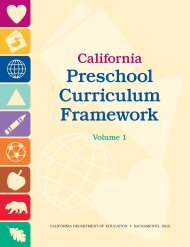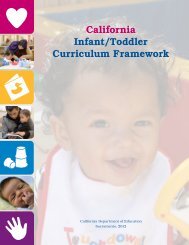Infant Toddler Learning & Development Foundations
Infant Toddler Learning & Development Foundations
Infant Toddler Learning & Development Foundations
Create successful ePaper yourself
Turn your PDF publications into a flip-book with our unique Google optimized e-Paper software.
The California <strong>Infant</strong>/<strong>Toddler</strong><br />
<strong>Learning</strong> and <strong>Development</strong><br />
<strong>Foundations</strong> represents part of<br />
the California Department of Education’s<br />
(CDE’s) comprehensive effort to<br />
strengthen young children’s learning<br />
and development through high-quality<br />
early care and education. The foundations<br />
describe competencies infants<br />
and toddlers typically attain during the<br />
birth-to-three-year period. In order to<br />
make developmental progress, young<br />
children need appropriate nurturing.<br />
Both supportive home environments<br />
and high-quality early care and education<br />
programs can facilitate children’s<br />
attainment of the competencies specified<br />
in the foundations by providing<br />
safe environments and an emotionally<br />
secure base for active, playful exploration<br />
and experimentation.<br />
During the infant/toddler years, all<br />
children depend on responsive, secure<br />
relationships to develop and learn.<br />
As stated in the CDE’s <strong>Infant</strong>/<strong>Toddler</strong><br />
<strong>Learning</strong> and <strong>Development</strong> Program<br />
Guidelines (2007), high-quality programs<br />
offer infants and toddlers primary<br />
relationships in small groups.<br />
Such programs provide personalized<br />
care that reflects consideration for<br />
individual differences among children.<br />
Programs also develop partnerships<br />
with children’s families to connect<br />
Introduction<br />
children’s experiences at home with<br />
their experiences in the infant/toddler<br />
program. These partnerships with<br />
families are the cornerstone of culturally<br />
sensitive care. Connections with<br />
children’s early cultural and linguistic<br />
experiences are critically important<br />
for their social-emotional well-being,<br />
the development of their identity, and<br />
learning. In addition, children may<br />
have a special need that requires particular<br />
accommodations and adaptations.<br />
To serve all children, infant/toddler<br />
programs must work to provide<br />
appropriate conditions for each child<br />
and individually assist each child’s<br />
movement along a pathway of healthy<br />
learning and development.<br />
Over 20 states have either developed<br />
infant/toddler standards documents or<br />
are in the process of doing so. Many of<br />
them have sought to align infant/toddler<br />
standards with preschool learning<br />
standards. Because both infant/toddler<br />
and preschool foundations in California<br />
cover a broad range of learning<br />
and development domains, the<br />
term foundations is used rather than<br />
standards. This term was selected to<br />
convey that learning across all developmental<br />
domains builds young children’s<br />
readiness for school. In essence,<br />
the foundations pertain to young children’s<br />
current and long-term develop-<br />
ix
















